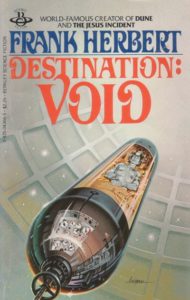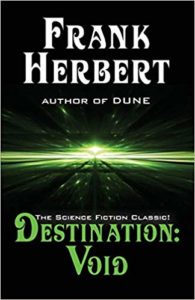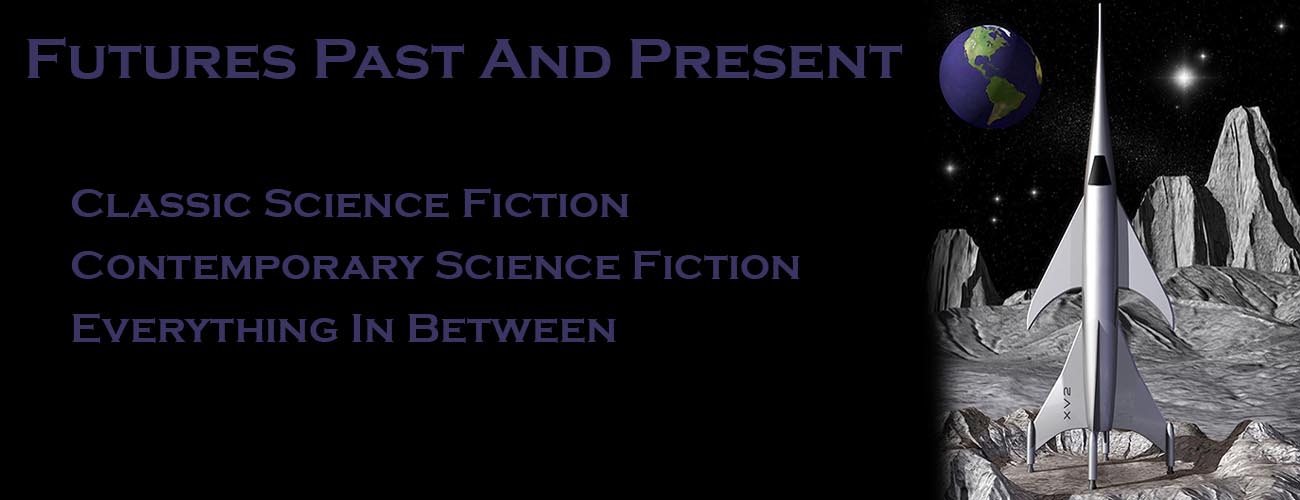 Destination: Void
Destination: Void
Frank Herbert
ebook $7.99
A few months ago, I posted about Frank Herbert’s birthday and read a couple of his short stories. I’ve had a few of his novels sitting around for, well, quite some time. So I started reading Destination: Void.
I finished it two days ago. Up until a few years ago, I wouldn’t start another book until I had finished the one I was reading. Lately, I’ve started reading whatever is at hand resulting in a number of books lying around in various stages of completion. Destination: Void was one of those.
Before I review the book, I want to say that this was the revised edition. The novel was originally published in the 1960s. A revised edition was published in the late 1970s, shortly before Herbert and Bill Ransom collaborated on a sequel, The Jesus Incident.
Herbert clearly spent a lot of time researching the science. Advances in the sciences he based his story on were what made him revise the book. Although I have a copy of the original, I’ve not read it and probably won’t anytime soon.
I don’t mean that to say the book is bad. It isn’t. But it’s not a quick, easy read either.
A project based on the Moon has been launching colony ships at various stars. They are traveling at sublight speed, so most of the people on them are frozen, except for a skeleton crew, which will enter hibernation once the ship is far enough from the solar system. All of the people on the ships are clones. The ships are controlled by organic brains wired into a central computer system in the ship.
Every ship before the one in this book have been destroyed before they get more than a few weeks out. When the book opens, the last brain in this particular ship has just died. The four crew members have to either figure out a way to create an organically based AI to run the ship or turn back.
There are multiple things happening here, and everyone has an agenda. Herbert bounces between the four crew members viewpoints. (There’s a term for this approach, but I don’t recall what it is and am too lazy to look it up.) We quickly learn that each member of the crew has some type of post-hypnotic suggestion influencing them, including one who will destroy the ship if certain conditions are met.
 Destination: Void isn’t an action oriented novel, although there are a few action scenes. Rather it’s a deep, philosophical work. Much of it is dialogue, usually in the form of arguments among the crew. It’s a rewarding book if you work at it, and it held my interest. (Don’t think that because I picked it up and put it down multiple times I wasn’t enjoying the book.) Much of the scientific content read to me like it was pseudoscience mumbo-jumbo, but that may have been because most of the science is outside my field. Biology, psychology, and artificial intelligence aren’t my areas of expertise. The science is central to the story and the resolution.
Destination: Void isn’t an action oriented novel, although there are a few action scenes. Rather it’s a deep, philosophical work. Much of it is dialogue, usually in the form of arguments among the crew. It’s a rewarding book if you work at it, and it held my interest. (Don’t think that because I picked it up and put it down multiple times I wasn’t enjoying the book.) Much of the scientific content read to me like it was pseudoscience mumbo-jumbo, but that may have been because most of the science is outside my field. Biology, psychology, and artificial intelligence aren’t my areas of expertise. The science is central to the story and the resolution.
Destination: Void is not pulp at all, and I know it won’t be to the taste of many of my friends or people who read this blog.
There are three sequels that look to be a bit more adventure oriented, and I’ll probably read at least the first of them.
